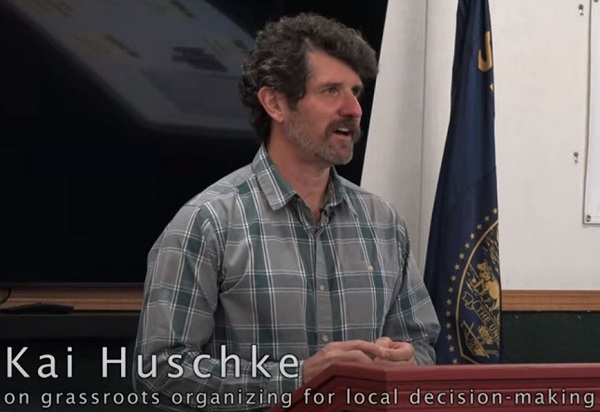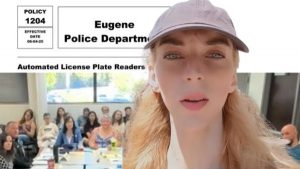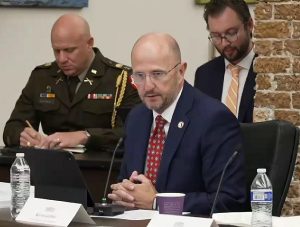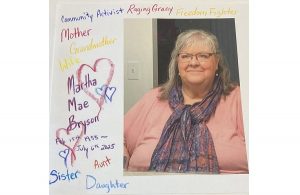After organizing to Stop the Spray, Lincoln County residents discuss next steps
12 min read
In 2023, Lincoln County residents came together to oppose an aerial spraying project that threatened the Beaver Creek watershed. In a meeting in Waldport Sept. 24, they discussed that effort and potential next steps.
[00:00:16] Kai Huschke (Oregon Community Rights Network): You guys got together, you voted, no more spray, and then suddenly you get an announcement that you’re going to be spraying again. As the mobilization started to happen and started people to poke the so-called authorities as to what’s going on here, I know there were various lots of meetings with the water district here. I ended up coming in on Zoom on one of those, and I know there was a state legislator, there was a county commissioner there…
[00:00:41] There’s opportunities then for you to be heard, right? So you can be heard, it can be documented, but the end effect is: The thing’s going to happen because largely the permitting process is about permitting something. It’s not about stopping something, it’s not about prohibiting something. It’s about making sure it happens.
[00:00:59] And almost, in a way, giving the illusion that there’s a means of, let’s say, democracy that can come to bear. We’ll make sure that people are heard. We’ll make sure that people have the opportunity to hold the corporate applicant to account, without usually realizing—and it’s understandable, because a lot of this is hidden, it’s very thick, it’s very confusing—that the rules when they are set are often set by the very industry of which those rules are supposed to regulate.
[00:01:26] So the timber industry largely sets its own rules. The mining industry sets its own rules. The fossil fuel industry sets its own rules. Big agriculture sets its own rules. And they do it through the means of the federal government and the state government.
[00:01:39] The situation you have is, it comes from something very deep, systemic. Someone didn’t decide just last week that the spray was going to happen. This is all part of a well-built system.
[00:01:49] The pesticide spray law that you have on your books here in Oregon came from ALEC, the American Legislative Exchange Council, which is made up of large corporate entities who write legislation for states and hand them over to state legislators.
[00:02:04] And if you look at their template version compared to the state version, it’s almost verbatim. And that is the state preemptive law that basically says local communities have no authority over regulating or prohibiting spray, which is largely what you got hit over the head with (legally speaking) when you passed the spray ban. And then were told you couldn’t have your spray ban.
[00:02:24] So, the system is very well built. In fact, we would often say the system works just fine. And therefore, we may need to do something about changing the system. Because very often we’re told, ‘Well, the system is broke somehow, it’s gone off the rails.’ Well, no, actually, the system is doing exactly what it was devised to do. It just happens not to be what we thought it should be doing in the first place.
[00:02:45] People are always looking for answers or options within an existing system to think, ‘Well, maybe if we can find the right legal argument, or maybe we can find the right person in office, they’ll advocate for us.’
[00:02:58] And that’s somewhat of a logical thing to do, but as you understand the system more, you’ll come to see that there isn’t really those silver bullets or those doorways through, and that really the answer lies within this room or within your community to figure out what we’re going to do, because the people you thought were in positions to actually help you are really about being actuators of the existing system that allowed the harm to show up in the first place.
[00:03:24] And it’s a hard thing to reconcile with, because again, we’re taught we have a system of government, that we have representatives, we have issues, they’re supposed to represent us. But again, in a lot of those meetings it was made very clear that they were not going to represent you.
[00:03:37] Systemically, our system is largely set up to be about commercial interests, about commerce; that if we produce things and do things, we’ll have other societal benefits, therefore we have to protect the commercial pursuit element of it to the highest level, without realizing (or even when they do realize) that there’s going to be consequences when you do that, ultimately making places like this area a sacrifice zone, or West Virginia, or Central Pennsylvania, or Northern Nevada, or wherever it may be, where all these industrial practices continue because the value of the system is:
We need commercial activity, which then also gets attached to things like property, and which is a big conversation to have, meaning should large entities have so much control over property such they can do what they want even at the expense of the rest of us, even at the expense of the ecosystems that we’re a part of, so on and so forth.
[00:04:33] And you have largely large corporate interests that control your forests in this state, and they see it as purely as a commodity. And that money is not staying here. Money is going back to shareholders.
[00:04:46] We also have a system that’s set up that your lower levels of government are the most disempowered to have decision-making over the things which affect you the most. So when we think about health, safety, and welfare, you would think the government of which you’re most closely associated with would have the most power to advocate for you on your behalf, whether it’s you, whether it’s the forest ecosystem, whether it’s the salmon, whatever it may be.
[00:05:11] How do we actually bring the balance up, or actually such that communities—the place you’re part of, and the people—ideally have more power than those who are trying to do things to undermine your health, safety, and welfare?
[00:05:23] That’s where we need to go, and so you have to be strategic in your thinking about how we can actually be effective agitators, really. That’s that community resilience/resistance stuff, but yeah, we can definitely help figure out what a real Forest Practices Act would look like.
[00:05:37] Not a Forest Practices Act that allows corporate actors, basically, to benefit, but a real Forest Practices Act that takes in the forest, takes in the community, takes in all the things that aren’t considered today, in fact are just seen as part of the sacrifice of doing timber in the way that they do it.
[00:05:54] And again, keep in mind, it’s the same scenario they use for big ag. It’s the same scenario they use for mining, it’s the same scenario they use for fossil fuels, same scenario that you use for large-scale development too, right? Development over everything else, despite the schools maybe not being in place, or the community centers, and all these other things that eventually the taxpayers get to pay for.
[00:06:14] Because the large corporate developers, they come in, they get their profit, and then they leave. All the industries basically operate under the same game plan and they’re doing a really good job, sadly.
[00:06:25] And so by the time when things show up in our communities, or are about to show up in our communities, they’ve already been predetermined.
[00:06:34] In these moments, as you heard on those calls and probably repeatedly, there’s nothing we can do, to the point where your county commissioners sent a letter to (I think) the landowner (and I would say in a very begging tone), ‘Please don’t spray us,’ which makes you wonder: I thought we lived in a democracy. I thought we had rights of self-determination to actually fulfill the things that we need to within the places where we’re at.
[00:07:01] So these moments, as horrific as they are, can be opportunities to reassess: What is the system? Where is the system going? What does the system value? And is the system working? And using your situation now as a means to understand that. And that’s the kind of work we found ourselves eventually doing.
[00:07:20] So, what does the economic model look like that could be different that actually creates jobs, keeps the money locally? What would timber look like if it was actually community-owned? What if that money came back into the community? What if you found practices that weren’t environmentally damaging or threatening public health?
[00:07:37] It’s all feasible, but the system itself isn’t going to allow it because people are making money off of it. And as soon as you actually go to those centers of power, they find ways to actually push you back.
[00:07:47] So, it becomes big questions largely from who’s deciding: Is it you deciding or is it someone deciding for you? So these are very deep-seated, systemic questions that have to be answered that largely start here. They start when things flare up.
[00:08:03] We’ve come to the understanding that there are things that we have to build outside the existing system in order to try to change that system. And sometimes it means physically standing up to the very system itself that’s illegitimately putting yourself in harm’s way. And that’s exactly what’s happening now.
[00:08:19] They’ve legalized a practice that is harmful, and it doesn’t make it right. And they have told you there’s nothing we’re going to do to actually stop it. So you’re left with, in some ways, a very easy challenge, which is: Are we going to try to stop it or not?
[00:08:33] Now, whether you will or not is a different thing. The question is, are people going to mobilize in a way to potentially put themselves in front of the spray operation? And that, again, is not an easy scenario to think about.
[00:08:45] And then the question is: Where do we go from here? Do you keep mobilizing on those single issues or do you start going upstream and start dealing with the structural realities that causes stuff in the first place? That’s largely what the work has been about. We call it community rights.
[00:09:00] So Lincoln County Community Rights formed a group a few years back and posed the question of saying, ‘Why don’t we get to decide what happens in our own community? We want to protect ecosystems in a different way than the current system recognizes, because our legal system sees nature as property, as a thing, as a commodity, as something that could be used and abused or protected if so be, but the ecosystems itself don’t get to be protected to the highest level as they probably should be.’
[00:09:28] Often what happens is people localize their energy into, let’s say, a legislative effort. And when they’re not successful, it becomes very depleting and defeating and it’s very hard to regenerate. So I think the understanding is you need multiple things going on almost simultaneously to maintain the reality of what needs to get done.
[00:09:46] And that’s again, not easy, because we’re in a situation where we have very little option, we have very little resources, and we have very little recognized authority against a system that has all of that in spades on the other end. And so it’s very disproportionate in how we actually can go about doing things, but it’s that very mentality, I think, that may eventually change the system itself.
[00:10:08] People in Lane County are about to launch an initiative effort to protect their watersheds, so, pass a county law that would actually protect their watersheds, or at least attempt to do so. You have people in Douglas County that are bringing notice to a private dam that’s affecting the lamprey and the salmon in that particular river system and wanting to see if that dam can be taken down because it’s doing nothing but benefiting private landowners but having all kinds of environmental impact as well as public safety impacts if that dam were to fail and it has a long history of not being well kept.
[00:10:41] So there’s cross-pollination that’s possible here to band people together, and I know that myself and others that have been doing this work would be more than happy to be involved and supply whatever advice or ideas that we can.
[00:10:53] And in Oregon, because Lincoln County did what it’s doing, because of what Lane County and other counties are doing, we formed a state group called the Oregon Community Rights Network. Not to just highlight the various issues that communities are having and trying to face and change, but also to be an organized unit to begin doing that structural transformational change that needs to happen at the state level, such that we start to have more regency over our own existence. Not just for people, but for the places that we’re a part of.
[00:11:23] And that’s ten years in now. The system still is there. But there have been movements, and in fact, I would say, because Lincoln County, because you guys voted the aerial spray ban in, it changed the dynamic of what might be possible—because you weren’t willing to believe that we can’t do this, and you did it anyway. And that got a lot of people to pay attention, including the system itself that wasn’t very happy you guys did what you did.
[00:11:48] But I think it got other groups to understand that yeah, maybe it is a deeper systemic problem than we realize. And maybe we have to start going there. And it’s not going to be an easy road and it’s not going to be a very clean road because it’s going to be people debating on what needs to be, what not needs to be.
[00:12:03] You may come to the conclusion that you don’t want to do it. You may come to the conclusion that it only has to go so far. You may come to the conclusion that it has to go very deep.
[00:12:11] So there’s democracy questions there, there’s the efficacy of your environmental situations there, there’s the livelihood of your community questions there, there’s a lot of big things that get wrapped up into what’s materialized here, which was basically saying: ‘We don’t want to be sprayed because you’re spraying in the watershed of which we’re a part of.’
[00:12:29] But I think the ultimate good thing is about people deciding what kind of government they want. If you think about your Article 1, Section 1 of your state constitution, or you think of the Declaration of Independence, for instance, it’s about all power being inherent in the people, and if your government isn’t working, you have not only the right, but really the obligation to change it, and it may have to be changed to a very deep level.
[00:12:51] A lot of us understand we have to transform into something new, and so it’s almost a discipline to be able to give yourself that space. Very simplistically speaking, the people who write the laws, the people who wrote the Constitution, for instance, well, they put words on paper.
[00:13:08] But in a very simplistic way, we have to understand, we can put words on paper. That’s what Lincoln County Community Rights did. They put words on paper. And so that exercise alone, it is what we have to get to, like, we can actually define what we need in the form of the structure of government, in the form of laws.
[00:13:26] And those are the kind of things I think that are worth discussing about.
[00:13:29] John Q: Kai Huschke speaks in Waldport as community members in Lincoln County come together to Stop the Spray. They started discussing ways to organize a movement to correct a system that threatens our watersheds and our democracy.
[00:13:42] Learn the latest from efforts in Lincoln, Lane, Douglas, and other counties from ORCRN.org, the Oregon Community Rights Network.




